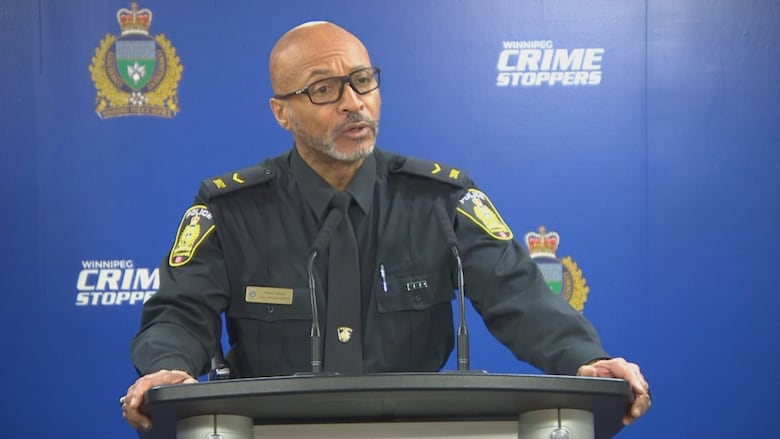Winnipeg parents charged with manslaughter in fentanyl death of 1-year-old girl
Garry Daniel Adrian Bruce, 38, Sabrina Faye Boulette, 37, arrested Friday after daughter’s death in March 2023

Police have charged two Winnipeg parents with manslaughter after their one-year-old daughter died from fentanyl intoxication in March 2023.
Garry Daniel Adrian Bruce, 38, and Sabrina Faye Boulette, 37, were arrested at their home on McKenzie Street on Friday, police said in a news release Monday.
Const. Claude Chancy said the parents didn't call 911 until several hours after they knew their daughter, Hanna Boulette, had been exposed to the drug.
"We do not need to see infants dying at the hands of irresponsibility," he said at a news conference at Winnipeg police headquarters Monday morning.
"Whether or not that person has an addiction or a substance abuse problem, this is inexcusable."
The Winnipeg Police Service child abuse unit started investigating the death on March 23, after a man called 911 and told police his child had become unresponsive at their home, police said.
"It's something that they knew that the child was in distress at the time and could have called 911 prior to when they did," Chancy alleged.

Winnipeg fire paramedics went to the home on Stella Avenue and gave Hanna CPR before she was taken to the hospital, where she was pronounced dead.
Both parents were arrested, though not formally charged, for criminal negligence causing death, and the man was charged with possession of a controlled substance after officers found a small amount of fentanyl on him when he was arrested. They were later released.
There was an attempt by the parents to provide medical assistance to the child before police were called, Chancy said.
The parents had had contact with police in the past and were using drugs when their child was exposed to fentanyl, he said. The parents and their child were the only people at the home.
During the investigation, the parents gave little information about the child's death and offered details about the circumstances leading up to the girl's death "that were not truthful," Chancy said.
Toxicology reports released in June and an autopsy found the girl died from "high levels of fentanyl intoxication," police said. When that was determined, the child abuse unit consulted with the Manitoba Prosecution Service about laying the manslaughter charges.
WATCH | Const. Claude Chancy talks about an increase in cases of children exposed to potentially fatal substances:
According to the province's chief medical examiner, Dr. John K. Younes, any amount more than a trace amount of fentanyl in a child can be fatal.
The parents are now in custody.
Manitoba's Advocate for Children and Youth Sherry Gott said news of how the child died is "devastating."
"I have repeatedly called for government to develop a comprehensive mental health and addictions strategy, and the circumstances around Hanna's death reaffirm the need for urgent action," Gott said in a written statement.
"Our hope is that those responsible for her death receive the supports they need to make positive, lasting changes so that this never happens again."

Police are dealing with an increase in such cases across Canada, Chancy said.
Last month, a two-year-old boy ingested fentanyl at a home in Winnipeg, he said.
"We know this society right now has a substance abuse problem," Chancy said.
"We still need to protect our children. So whether or not you have a drug problem, an alcohol problem, what have you, if you have children in your care, your first responsibility is their safety."
Dr. Darren Markland, an intensive care physician at the Royal Alexandra Hospital in Edmonton, says it's up to parents to protect their children from anything they're exposed to.
"Children are vulnerable to anything that we expose them to," he said. "Young children can put anything in their mouths, be it a drain cleaner or fentanyl."
He also noted how toxic the opioid supply is and harmful it has become.
"Even if this child was brought to medical attention rapidly, with an unregulated and uncontrolled drug supply ... the antidotes that we use may not have reversed this or saved the child," Markland said.



